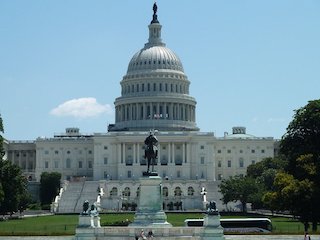UPDATE The House on Thursday passed the $280 billion Chips and Science Act, a bill to subsidize U.S. domestic semiconductor manufacturing and invest billions in science and technology innovation, in a bid to strengthen America’s competitiveness with China. The vote was 243-to-187. The measure is now on its way to the President for his signature.
The bill had strong bipartisan support — despite a last-minute push by House GOP leaders to oppose the bill. Twenty-four Republicans defied the leadership and joined Democrats in backing the measure, according to The Washington Post. The Senate had passed the bill Wednesday, Inside Towers reported.
Some members of the Congressional Progressive Caucus were squeamish on the bill. Sen. Bernie Sanders (I-VT) has been publicly critical and voted against it Wednesday. There was fear that its passage could be threatened if supporting lawmakers dwindled. Commerce Secretary Gina Raimondo met with the caucus Thursday to provide reassurances about guardrails included in the legislation.
On the House floor Thursday, Minority Leader Kevin McCarthy (R-CA) slammed the measure as a “$280 billion blank check” to the semiconductor industry. Rep. Guy Reschenthaler (R-PA) criticized the legislation as one that would benefit only “a single industry,” and several GOP lawmakers urged their colleagues to vote no.
Rep. Joseph Morelle (D-NY) countered by saying there were few industries that did not use semiconductor chips. “Chips run everything. Whether it’s your cell phone, your laptop, your automobile, it really doesn’t matter. And the fact is we have lost our competitive edge … This isn’t about a single industry. It’s about every industry,” reports The Washington Post.
“It will accelerate the manufacturing of semiconductors in America, lowering prices on everything” from cars to cell phones, President Joe Biden said in a statement. “It also will create jobs — good-paying jobs right here in the United States. It will mean more resilient American supply chains, so we are never so reliant on foreign countries for the critical technologies that we need for American consumers and national security.”
About $52 billion will go to microchip manufacturers to incentivize construction of domestic semiconductor fabrication plants — or “fabs” — to make the chips, which are used in a variety of products. A shortage of semiconductor chips during the coronavirus pandemic has caused price hikes and supply-chain disruptions in several industries.
The bill also includes about $100 billion in authorizations over five years for programs such as expanding the National Science Foundation’s work and establishing regional technology hubs to support start-ups in areas of the country that haven’t traditionally drawn big funding for tech.
By Leslie Stimson, Inside Towers Washington Bureau Chief





Reader Interactions